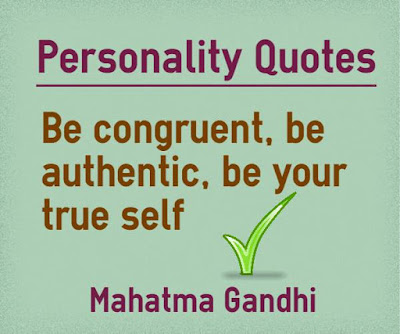Authentic Leadership
 |
| Authentic Leadership |
Spurred by deep-rooted concerns about the ethical conduct of today’s leaders based on chilling examples of corporate & government malfeasance, many leadership thinkers have called the need for a new kind of leadership—Authentic Leadership. Manifested by the unethical conduct of many leaders in positions of authority, this discipline requires a thorough understanding of the underlying meaning of true leadership. Only then it can be exemplified in its true spirit.
Authenticity can be traced back to the ancient Greek philosophy which is also reflected by Greek aphorism ‘Know Thyself’. The root word for authenticity in the Greek language is the word ‘authento’ meaning to have “full power”. Socrates also argued the point that an ‘unexamined life’ is not worth living. Aristotle followed with a view of ethics through a concept of ‘self-realization’ following a pursuit of the ‘higher good’ when the soul is in alignment with the virtues for a complete life.
There have been numerous definitions of authenticity and how it’s measured in the conduct of an individual by keeping in accordance with the choices they make. Many believe that authenticity is about accountability & trust. Some argue the fact that it’s about doing the business while keeping intact with ethical considerations. Some focus on the end goal rather than on the materialistic benefits that it offers which is the mean.
If we take a broader view at it, we could probably say that authentic leadership should exemplify both behavioral consistencies and a positive ethical environment to draw out peak performance. Nalumbwa, Avolio, Gardner Wernsing and Peterson define authentic leadership as:
 |
| Authentic Leadership |
A pattern of leader behavior that
draws upon and promotes both positive psychological capacitie & a positive
ethical climate, to foster greater self-awareness, an internalized moral
perspective, balanced processing of information, and relational transparency on
the part of leaders working with followers, fostering positive self
development.
If you would have to simplify the
above idea, it would be this: An Authentic leader is someone who consistently
exercises a good work ethic while at the same time keeping themselves aligned with
their moral compass which in turn leads to accountability and transparency. Most
frequently the reason that leaders are not able to practice authentic
leadership is because they are trying to grow without a well-understood
mission. Without clarity of purpose, it is difficult to be authentic. Without
clarity of mission, a leader can be busy most of the times and still not be
productive. Therefore, its important to understand your purpose first before
overlaying the plans for its execution.
 |
| Authentic Leadership |
Your priorities should be crystal clear in your mind before you set out to do your task. For example, for many leaders their motivation to work is for the money that comes from their position and not necessarily to lead or guide people and help them become better. For how much and for how long do you expect from such a leader to perform their reserved duties and tasks? Certainly, such type is going to drain out soon. Of course, the motivation to work needs to be shifted from just monetary aspect to a point which provides maximum opportunity of growth not only for the leader but also for the followers and the organization alike.
If you want to be trusted & respected, you need to become authentic. And for that, you will have to introspect within yourself and be rational in your approach to make some changes to foster not only your own growth but others growth as well. What is your take on Authentic leadership and what are some of the practices that leads to being more authentic? Share your thoughts!
Bibliography
|
F.o., Avolio, B.J.,
Gardner, W.L., Wernsing, T.S., & Peterson, S.J. Walumba,
"Authentic Leadership: Development and validation of a theory-based
measure," Journal of Management, pp. 89-126, 2007. |














0 comments:
Post a Comment
Please do not enter any spam link in the comment box.